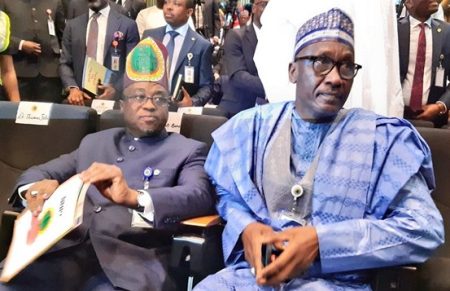 *Review Committee members disown Bill
*Review Committee members disown Bill
*Shell postpones $30bn investment
*Lawmakers polarised
Hector Igbikiowubo
11 March 2013, Sweetcrude, Lagos – The Nigerian government’s Petroleum Industry Bill, PIB, much-touted as Diezani’s revolutionary bill, has suffered a major set-back owing to a plethora of factors, including members of the review committee disowning sections of the document before the National Assembly; mounting discontent from International Oil Companies, IOCs; and, obvious polarisation of federal lawmakers along ethnic cum geopolitical lines, all on account of the bill.
Some members of the special technical committee headed by Senator Udo Udoma, which was set up to review the PIB before presentation to the National Assembly, have disowned sections of the bill before the National Assembly, insisting they are not part of their recommendations submitted to the Minister of Petroleum Resources, Diezani Alison-Madueke.
While other members of the committee prefer to express their reservations in private, to protect their business and political interests, Comrade Peter Esele, President General of the Trade Union Congress of Nigeria, TUC, has been more forthright with his submissions.
“The one that is with the National Assembly right now, I have some issues with that one. I think it makes the Minister of Petroleum too powerful and I think the National Assembly will deal with that one. First, we submitted a draft to the Federal Government, from our draft to what got to the National Assembly is a different ball game,” he disclosed.
Comrade Esele stated that there were people behind the scene also working on the bill, adding that this was a source of concern for members of the task force.
“The initial reservation of some members of the task force was that if you had technical people behind the scene looking at the bill, why didn’t they join our committee so that we can all be on the same page, we debate the provisions and move on?” he asked..
The union leader declined pressure to divulge areas of the bill reviewed by the task force that appear at variance with the bill before the National Assembly, noting that the TUC was looking forward to the public hearing at the National Assembly during which the body intends to register its concerns and observations.
“The national executive of the TUC had a meeting in Benin where they talked about too much powers being concentrated in the office of the Minister of Petroleum,” he volunteered.
The Minister of Petroleum Resources, Diezani Alison-Madueke, could not be reached for a reaction at the time of filing this report. An email to one of her personal assistants sent three weeks before publication elicited no response.
 Shell Nigeria postpones two oil projects valued at $30bn
Shell Nigeria postpones two oil projects valued at $30bn
To register its discontent with the fiscal terms contained in the Petroleum Industry Bill, among other provisions therein, Shell announced late last month, it has postponed two major projects in Nigeria worth $30 billion due to the delay in the passage of the reform bill.
Mutiu Sunmonu, Managing Director of Shell Petroleum Development Company, said Nigeria needed to develop two deepwater fields every year, at a cost of $30 billion, to maintain a steady production at three million barrels per day, b/d, but added that this had been blocked by the uncertainty surrounding passage of the bill.
“Onshore production is plagued by serious financing problems. We have two big projects costing $30 billion we would like to do. But we are waiting for the Petroleum Industry Bill to allow us to make such investment,” he said.
Sunmonu also disclosed that production from the onshore fields was nowhere near full capacity with sabotage, attacks and crude oil theft, causing many outages.
Mobil demand competitive terms
Managing Director of Mobil Producing Nigeria Unlimited, Mark Ward also said at the recent Nigeria Oil and Gas conference that Nigeria must ensure its tax and fiscal packages offered fair returns on investments.
“Nigeria needs to be competitive in terms of returns on investment. We invest, we expect returns based on the contract in place,” Ward said.
The PIB, designed to cover everything from fiscal terms for offshore projects to the reform of the state oil company, has been on the legislative cards for over four years, but has yet to be passed into law.
Meanwhile, the Federal Government plans to hold talks with foreign oil partners in coming weeks, over a lull in crude oil exploration. Production and reserves have stagnated in the country over the last six years.
Group Executive Director in charge of exploration and production at the Nigerian National Petroleum Corporation, NNPC, Abiye Membre, said at the conference that the lack of exploration activities in the past few years is a major concern to the government.
“We plan to hold talks with our joint venture partners in coming weeks on the need for more concerted efforts on drilling programmes,” Membre said.
PIB: DPR suspends fresh award of oil license
Even as the logjam over the PIB persists, crippling oil and gas exploration activities, the Department of Petroleum Resources, DPR, Nigeria’s emasculated oil industry watchdog, has suspended award of new exploration licenses pending the passage the bill.
Mr. Osten Olorunsola, Director, Department of Petroleum Resources, DPR, who made the disclosure, said passage of the bill will help ensure predictability and commitment, adding: “You need firm commitment and firm predictability of the law. We have to wait for the bill to be passed.”
He disclosed that while major energy companies have toned down their investments and shunned exploration because of uncertainty about the new law, smaller producers are increasing drilling activities in an effort to boost output.
Samir Gadio, a London-based emerging-markets strategist at Standard Bank Plc, said, “The major concern is that oil production has remained virtually stationary over the past few years due to the lack of investment in the sector which partially reflects the uncertainty surrounding the bill.”
The Petroleum Industry Bill was first sent to the National Assembly in 2008, but it did not become law during the tenure of that legislature. It was reintroduced by President Goodluck Jonathan in July last year.
Fiscal provisions in the bill seek to raise Nigeria’s share of revenue to 73 per cent from 61 per cent, Alison-Madueke had stated.
Royal Dutch Shell Plc, ExxonMobil Corporation, Chevron Corporation, Total SA and Eni SpA run joint ventures with the NNPC, that pump more than 90 per cent of the country’s oil.
Companies, including Shell and ExxonMobil, have criticised the fiscal terms as likely to make investment in offshore oilfields unprofitable. Most have held back on funding more exploration while Shell and ConocoPhillips have sold some of their onshore assets to Nigerian companies.
 Lawmakers polarised
Lawmakers polarised
The Nigerian Senate got into a rowdy session when the PIB came up for discussion last week as those from the northern part of the country stoutly opposed the provision of 10 per cent Host Community Fund in the bill.
The provision requires operating companies in the Niger Delta, home to Nigeria’s vast oil resources, to pay 10 per cent of their net profits to the fund for the development of the communities.
Senators from the north had vowed to frustrate the passage of the bill, claiming that an additional 10 per cent derivation for oil-producing states was unjust to other parts of the country.
However, speaking on the floor of the Senate, a day after the rowdy session, Senator Ita Enang observed that 83 per cent of oil blocks in the country are owned by Northerners.
“There should be equity and federal character in the allocation of oil blocks in this country. Eighty-three per cent of all present oil blocks are held by northerners,” Enang said without any of the senior lawmakers contradicting him.
Enang, therefore, demanded a review of oil block licences in the country even as other senators from the South urged him on.
On the strength of arguments canvassed along geo-political lines, the PIB scaled the second reading considered most crucial in the life of a bill on the floor of the Nigerian Senate.
This move implies that the most controversial bill may be on its way to passage at the Senate within the next few months. The previous Senate had also passed the bill, but it got stymied in the House of Representatives, where lawmakers remain sharply divided along geo-political lines.
Given the sharp division in the House of Representatives, observers say the bill may still face an uphill task in the House.



